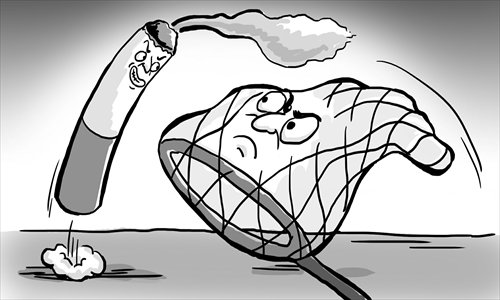Courage to push for smoke-free China should come from top

China can achieve a great deal when it focuses, as mega-events in the last few years have shown. Nevertheless, tobacco epidemics, an obvious and serious threat to the public health in China, have escaped the close attention of the Chinese authorities so far. Why?
With over 300 million smokers, China loses 1 million lives annually due to smoking-related diseases. It's true that fantastic events like the Olympic Games will climax and catch public eyes immediately, while tobacco control is a prolonged engagement and much less glamorous. China's laggardly tobacco control efforts are, most probably, a matter of negligence or intent, rather than an incapability to get the job done.
China joined the WHO-initiated Framework Convention on Tobacco Control (FCTC) in 2006. Five years later in January 2011, when the obligations of the FCTC should have been met, China's delivery was extremely pitiful.
No national law was established to ban smoking in public places, and smoking was barely reduced. Smoking, not recognized as a chronic, addictive disease but considered a "bad habit," is not covered under medical insurance. Illegal and disguised tobacco advertisements and promotions spread everywhere, and tobacco taxes were not sufficiently raised to lower tobacco sales.
All in all, China received a score of 37 out of 100 on the five FCTC key indices in 2011, according to a report by the Chinese Center for Disease Control and Prevention.
All countries with good tobacco control have demonstrated three common characteristics. Public health workers and medical professionals have taken the initiative to promote tobacco control ideas and actions. Non-smokers at large have changed their previous status of "a silent majority" into vibrant protesters demanding their right to reject secondhand smoke. Then governments have responded to the call and installed tobacco control legislation and corresponding practice.
Reportedly, about one half of Chinese male doctors smoke and governmental actions in tobacco control are inadequate. However, we have seen glimpses of hope burst out in China.
In December 2011, Xie Jianping, deputy director of Zhengzhou Tobacco Research Institute, was appointed an academician of the Chinese Academy of Engineering (CAE), for his research in refining low-tar cigarettes. Public fury was soon sparked, and around 100 academicians wrote letters to the academy, asking for the CAE's review of this appointment.
In April this year, the State Tobacco Monopoly Administration (STMA) applied for the 2012 National Awards for Science and Technology. Under a chorus of opposition from health officials and the public, the application was rejected.
Not long ago, the China National Tobacco Corporation (CNTC), a sizable donor to the China Green Foundation, was given an award by the foundation for its "significant contribution to ecological protection." Anti-tobacco activists were outraged at this outcome and strongly criticized this award.
The above developments signify the growing awareness and corrective actions taken in China to combat the harm done by tobacco.
However, the finishing touch has to come from the Chinese government, which is responsible for protecting the welfare and health of the Chinese people.
Other than fulfilling the FCTC requirements as mentioned earlier, China's mission of tobacco control needs an extra push.
First and foremost, the State Council could establish a tobacco control commission relevant to tobacco control concerns. This team can make plans and policies for implementation. As tobacco control is an important and complicated issue, the creation of a top level command would be most helpful.
The function and structure of the STMA and the CNTC should be split to avoid the present pitfall of combining regulator and producer, emphasizing tobacco taxes and profits at the cost of people's health and welfare.
China can start a "smoke-free family" campaign. All visitors would be banned from smoking at the home turf. Instead, smokers could be encouraged to quit under the friendly persuasion of the "smoke-free family" members.
Central authorities could institute a "tobacco control lottery" and use part of its revenue to finance tobacco control activities. Chinese medical colleges and nurse training schools should set up classes to teach smoking cessation skills to students. Upon graduation, they could better manage smoking cessation services to help their patients.
The public school curriculum should include tobacco control. Students' positive attitude and built-up strength would carry into their schools, families and society to benefit everyone in the long run.
For more than two decades, I have voluntarily committed myself to the task of tobacco control in China. It is my firm feeling that this is an important, urgent and achievable mission in China. But time is running out and disasters are waiting, if the government continues to delay or evade this vital task.
The author is a social activist, a current affairs commentator at the CCTV news, former Seattle Chapter president of the National Association of Chinese Americans, and former president of Seattle Chongqing Sister City Association. opinion@globaltimes.com.cn